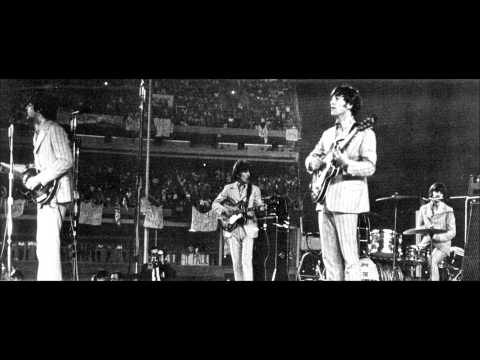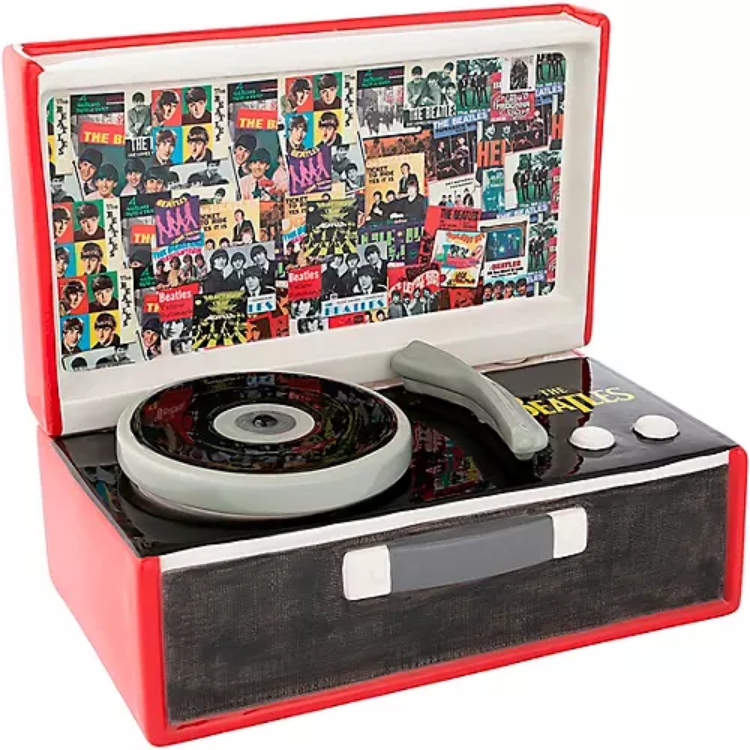The Beatles are taking a rest after the US Tour
- Register
- Log in to Tune-In
- Wishlist (0)
-
Shopping cart
(0)
You have no items in your shopping cart.
Beatles A Day in the Life Blog posts of '1966' 'August'
The Beatles ended their United States tour on a noisy note of triumph last night, to the cheering adulation of 25,000 screaming worshipers in Candlestick Park.
For 33 minutes they sang their songs from a big, well-guarded stage at the edge of the infield grass as their audience literally shrieked the intensity of its pleasure.
The crowd had been noisy before, applauding the earlier acts on the program, but at 9:27 it really let loose: The moment was at hand. The four musical Englishmen - wearing dark Lincoln-green double-breasted Edwardian suits and open-collared silk shirts - suddenly emerged from the Giants' dugout and ran to the big, fenced-in stage above second base. Bedlam.
They opened with "Rock and Roll Music" and closed with "Long Tall Sally" - singing 11 songs in all before they quit at 10 p.m. And during every moment of it, the Beatles had this peculiar little world squarely in their hands.
And the crowd, although howlingly appreciative, was, at the same time, markedly well-behaved.
During the entire time the Beatles were on the field, there were just three attempts by frenzied fans to reach them:
At 9:40 p.m., a group of about five boys climbed over a fence from the nearly empty center field bleachers and sprinted toward the rear of the infield stage. A covey of private police quickly intercepted them.
At 9:47 p.m., another group of about the same size tried the same tactic over the same route - and with the same result.
And just after 10 p.m. as the Beatles were leaving the stage, a husky disheveled boy jumped onto the field near third base - and put up a rousing battle with four guards before he was subdued.
The weather was pleasant - clear with only sporadic winds and reasonably mild temperatures, although Paul McCartney, in telling the audience goodbye, apologized for the cold.
Their stage, for instance, was also a cage. It was a platform elevated 5 feet above the infield surface, and it was surrounded by a metal storm fence 6 feet high.
Police - private and otherwise - were everywhere.
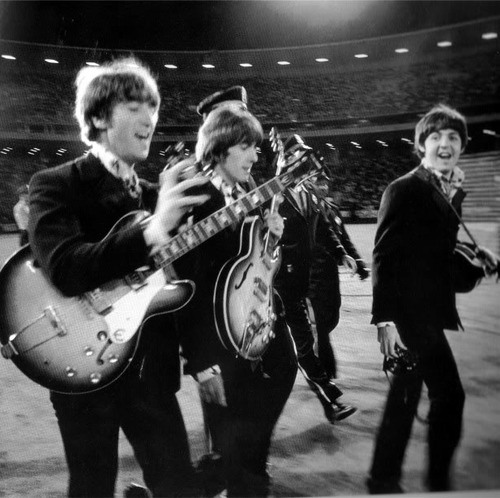
Live: Candlestick Park, San Francisco: The Beatles’ final concert
Although they made an unannounced live appearance in January 1969 on the rooftop of the Apple building, The Beatles' final live concert took place on 29 August 1966 at Candlestick Park in San Francisco, California.
There was a big talk at Candlestick Park that this had got to end. At that San Francisco gig it seemed that this could possibly be the last time, but I never felt 100% certain till we got back to London.
John wanted to give up more than the others. He said that he'd had enough.
The Park's capacity was 42,500, but only 25,000 tickets were sold, leaving large sections of unsold seats. Fans paid between $4.50 and $6.50 for tickets, and The Beatles' fee was around $90,000. The show's promoter was local company Tempo Productions.
The Beatles took 65% of the gross, the city of San Francisco took 15% of paid admissions and were given 50 free tickets. This arrangement, coupled with low ticket sales and other unexpected expenses resulted in a financial loss for Tempo Productions.
Candlestick Park was the home of the baseball team the San Francisco Giants. The stage was located just behind second base on the field, and was five feet high and surrounded by a six-foot high wire fence.
The compère was 'Emperor' Gene Nelson of KYA 1260 AM, and the support acts were, in order of appearance, The Remains, Bobby Hebb, The Cyrkle and The Ronettes. The show began at 8pm.The Beatles took to the stage at 9.27pm, and performed 11 songs: Rock And Roll Music, She's A Woman, If I Needed Someone, Day Tripper, Baby's In Black, I Feel Fine, Yesterday, I Wanna Be Your Man, Nowhere Man, Paperback Writer and Long Tall Sally.
The group knew it was to be their final concert. Recognizing its significance, John Lennon and Paul McCartney took a camera onto the stage, with which they took pictures of the crowd, the rest of the group, and themselves at arm's length.
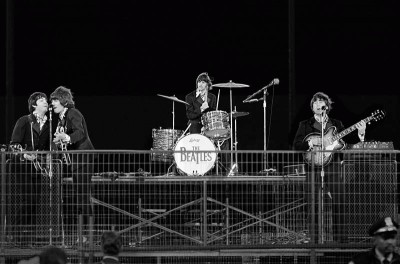
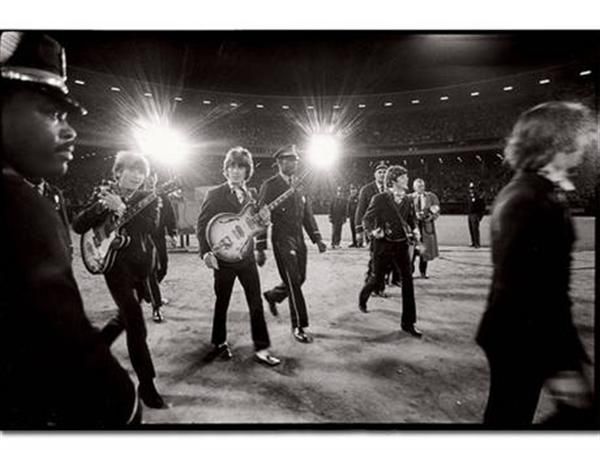
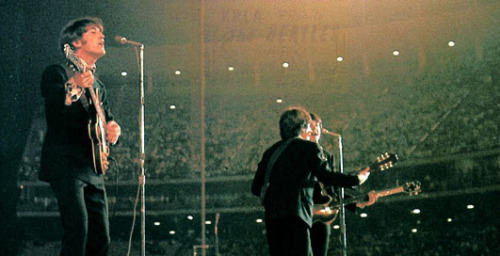
Day off in Los Angeles
On their third rest day in Los Angeles during their final tour, The Beatles were visited by Brian and Carl Wilson of The Beach Boys, whose 11th album Pet Sounds proved a key influence on the recording of Revolver.
The Beatles were renting a house at 7655 Curson Terrace in Beverly Hills, in which Brian Epstein had arranged for them to stay. They remained at the house throughout their stay in Los Angeles.

Day off in Los Angeles
The Beatles had three rest days in Los Angeles during their final tour of 1966. This was the second, and came immediately after their concert at the Colisium in Seattle.
They stayed at 7655 Curson Terrace in Beverly Hills, a private house which Brian Epstein had rented for them. They had previously stayed at the house two days earlier, and on this occasion stayed until their concert at LA's Dodger Stadium on August 28th.
Coliseum, Seattle, USA
The Beatles performed two shows at the Coliseum in Seattle on this day, at 3pm and 8pm, on the 12th date of their final tour. The concert took place at the Busch Stadium, and was seen by 23,000 people. The support acts were The Remains, Bobby Hebb, The Cyrkle and The Ronettes.
The group flew from Los Angeles at 10am, and stayed at Seattle's Edgewater Inn. They held a press conference at the hotel, where Paul McCartney was asked repeatedly about false claims that he was due to marry Jane Asher the following day.
In Seattle, Paul was questioned by journalists over a rumour that he was about to get married. Gossip had spread through the city suggesting that Jane was due to fly in to join Paul. The word was that a wedding cake had been ordered and a bridal suite reserved at a local hotel. A reporter said: 'Mr McCartney, would you please confirm or deny reports that you plan to marry Jane Asher here in Seattle this evening.' Playing along at first, Paul grinned broadly and said: 'It's tonight, yeah!' Then he added more seriously: 'No, she's not coming in tonight, as far as I know. I do hope it's not true. I'm going back to Los Angeles tonight so if Jane flies in I'm not even going to see her, let alone marry her!'
The Beatles had played at the Coliseum once before, on August 21, 1964 during their first full American tour.
Only 8,000 of the 15,000 available tickets had been sold for the 3pm show. The evening concert was full, however.
Afterwards The Beatles were due to fly back to Los Angeles on an 11pm flight, for two more days of rest. Their departure was delayed by five hours after one of the airplane's wheels was found to be worn out and in need of replacement.
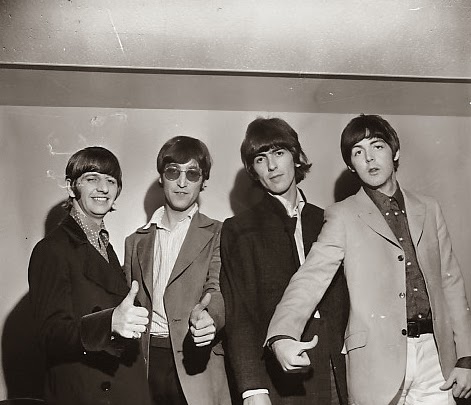
Day off in Los Angeles
Immediately after their second concert at Shea Stadium, the Beatles flew to Los Angeles. They arrived in the early hours of this morning.
There were no concerts scheduled for this day; it was a rest day for the group to recuperate before continuing their final tour in Seattle.
They stayed at 7655 Curson Terrace in Beverly Hills, which Brian Epstein had rented for this brief stay. The Beatles were visited by their former press officer, Derek Taylor, as well as members of The Byrds and The Mamas And The Papas.
In the evening Capitol Records' president Alan Livingstone threw a party for The Beatles, which was attended by well-known show business personalities including Edward G Robinson, Jack Benny, James Stewart and Groucho Marx.
Source: Beatles Bible
A photo from the day before at Shea Stadium
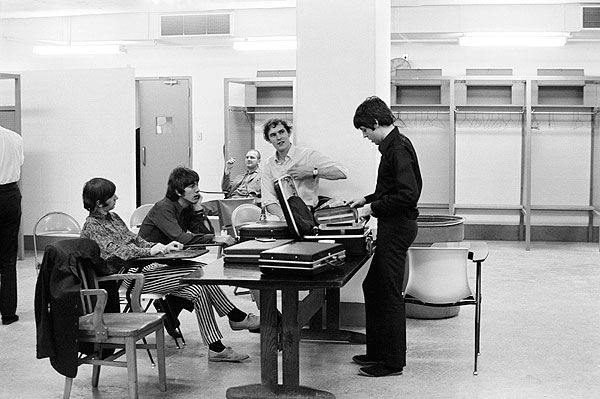
Live: Shea Stadium, New York
A little over a year after their first triumphant appearance at New York's Shea Stadium, The Beatles returned for a second time.
The concert did not sell out, with 11,000 of the 55,600 tickets still available. Nonetheless, The Beatles made more money from their appearance than they had in 1965, receiving $189,000 - 65 per cent of the gross takings of $292,000.
Curiously enough the second Shea Stadium concert had about 11,000 seats unsold. So it was a pretty unsettling time. And it was against this background that they said, 'Right, we definitely won't do any more. We are going to have a break and then we are going into the studio to make a record.' (George Martin)During the performance of Day Tripper hundreds of fans broke through barriers and attempted to reach the stage. They were held back by security guards and none managed to get close to The Beatles.When they played Shea Stadium again, for me it blended in with the first one, though it was said there were slightly fewer people there than the year before. For some reason I missed the police van that was taking us. I had gone back for something, and before I could get in the van, they slammed the doors and of it went. I was left at the hotel, so I got a cab, but that broke down in Harlem. Another cab took me to the stadium, but there were thousands of people, and I thought: 'Oh God, they're really going to let me in! I'm going to just knock on the door and say, "I'm with The Beatles?"' Then I saw the four of them banging out of a window, and they saw me wandering round the car park. It was like magic; they were shouting, 'There he is! Let him in!' (Neil Aspinall)Straight after the concert The Beatles flew to Los Angeles. They arrived the following morning in the early hours and enjoyed a rest day before flying on to Seattle.
The Beatles flew into New York in the late hours of August 21st during their 1966 tour of North America. They took August 22nd as a night off in New York, still making time for the following press conference at Manhatten's Warwick Hotel.
Also on this day, separately from the usual Beatles press event for New York City reporters, the group would hold a second press conference at the Warwick Hotel that was comprised completely of young Beatles fans. Arranged in conjunction with New York City radio station WMCA, the Beatles' Junior Press Conference allowed 75 lucky contest winners to attend and ask questions at the special event.
Q: "Would any of you care to comment on any aspect of the war in Vietnam?"
JOHN: "We don't like it."
Q: "Could you elaborate any?"
JOHN: "No. I've elaborated enough, you know. We just don't like it. We don't like war."
GEORGE: "It's, you know... It's just war is wrong, and it's obvious it's wrong. And that's all that needs to be said about it."
(applause)
PAUL: "We can elaborate in England."
Q: "I have a question for Paul. I don't know if you know about it yet, but two young ladies threatened to jump to their death from the twenty-second floor of the hotel here in Manhatten if they could see you. How do you feel about young girls acting this way?"
PAUL: "If they could see me?"
Q: "They wanted to see you-- If you would come over they wouldn't jump. The police finally rescued them. They threatened to jump unless you came over."
PAUL: "Good god, you know... Phew! I don't understand it. I don't know. Umm... silly, that. I'll see 'em, you know."
(laughter)
Q: "Will the Beatles be inactive when John goes on movie location for the (How I Won The War) motion picture?"
RINGO: "Yes."
JOHN: "I'm only doing it because we've got a holiday, you know. I wouldn't do it if we had any work. (pause) We're not out of work, mind you."
(laughter)
Q: "When you arrived at the airport and there were only nine girls waiting to meet you, were you disappointed, and do you think that's a reflection of a loss of popularity in this country?"
JOHN: (jokingly) "Yeah, we're real brought down by it."
PAUL: "Really disappointed!"
(laughter)
PAUL: "Three o'clock in the morning they expected millions."
(laughter)
Q: "Now that Paul is the only bachelor Beatle, do you find that the girls gravitate more to him than they do to the rest of you fellas? How do you feel about that?"
JOHN: "They always did!"
RINGO: "Yeah."
(laughter)
PAUL: "Well, the thing that we found... We found after all this business, of all the buttons that say 'I love Ringo,' "I love John,' John's were outselling everyone's."
JOHN: "A rather distinctive Beatle."
PAUL: "A distinctive Beatle."
Q: "This is for Paul and John. Do you think that happiness is really egg-shaped, or is it just a rumor from the egg marketing magazine?"
PAUL: "Hooo-hooo-hooo."
JOHN: "Ho, ho."
Q: "Do you think happiness is real, or just a fantasy?"
JOHN: "It's real, alright."
RINGO: (jokingly) "Depends how the eggs are cooked."
(laughter)
PAUL: (laughs) "That was about as good as anything."
Q: "Ringo, now that George has joined John and Paul in writing songs are you going to start writing your own songs?"
RINGO: "Umm, no."
Q: "Why not?"
RINGO: "I can't write them. I try, you know, but... alot of rubbish."
Q: "On your new album, 'Revolver,' I noticed alot of violins and even trumpets."
GEORGE: "Very observant."
(laughter)
Q: "How come you decided to use violins and trumpets?"
PAUL: "There were, uhh... I think there were three violins on the whole album, and three trumpets. So we're not exactly going overboard on 'em, you know. We don't use them all that much, but it was just that those tracks sounded better with violins and with trumpets than with us, you know. That's the only reason we use them."
Q: "This one to John, please. Any remarks whatsoever on some of the recent remarks attributed to you and the Beatles concerning religion?"
JOHN: "Well, I think I've said enough about that. I can't say anymore, and just sort of going over the same thing over again. You know, alot of it just is alot of rubbish and alot of hysteria."
Q: "Uhh, to John and Paul-- It's been said that Lennon and McCartney may someday replace the names Rogers and Hammerstein. Have you ever considered discontinuing performing and instead just keep on writing?"
JOHN: "No."
Q: "Would you rather perform, then?"
PAUL: "I mean, you know... When we're eighty we won't be performing. We may be writing."
JOHN: "And we don't want to be Rogers and Hart, either."
(laughter)
Q: "This is to all of you. You seem to be doing a Bob Dylan in reverse. That is, you became popular playing rock and roll and now you seem to be doing alot more folk rock. Would you care to comment on that?"
RINGO: "Folk rock."
PAUL: "It's not folk rock. Honest. Yeah, somebody said that the other day."
Q: "Songs like 'Eleanor Rigby' and..."
PAUL: "No, the thing is that-- That thing about Bob Dylan is probably right, in reverse, because we're getting more interested now in the content of the songs, whereas Bob Dylan is getting more interested in rock and roll. It's just, we're both going towards the same thing, I think."
Q: "Paul, I believe you have just recently purchased a farm in Scotland. Have you any intention of purchasing any further, being in the United States?"
PAUL: "No. I just bought that farm because it was very cheap. And, uhh, I always wanted a farm. And it's a nice place. But that's as far as it goes."
Q: "This is for John. There have been reports from Europe about too much reaction to your christianity remark. They say it represents a possibility of immaturity in American society. Do you think so?"
JOHN: "Uhh.. Who says so?"
Q: "It was said in overseas press."
JOHN: "Well, I mean... It's an opinion. That's all, you know. I don't... They're entitled to their opinion."
PAUL: "I think the thing about that is that, uhh, there are more people in America, so there are more biggots... just by head of population."
(laughter)
PAUL: "No, well... There are, you know."
JOHN: "What about Scotland?"
PAUL: "Well, you know... but I mean, you hear more from American biggots than you do from Russian biggots."
(laughter)
PAUL: "That doesn't mean the whole country's biggoted, you know. Does it?"
Q: "This question is to John and Paul. Is there any special significance in the use of the term, 'Yellow Submarine'?"
PAUL: "It's a happy place, that's all. You know, it was just... We were trying to write a children's song. That was the basic idea. And there's nothing more to be read into it than there is in the lyrics of any children's song. 'Sparky,' you know, it's the same kind of thing."
JOHN: "Sparky?"
PAUL: "Sparky. Correct."
(laughter)
Q: "Two years ago I traveled with you as a group, and this time you seem to be much more quiet, much more restrained. Do you think you're getting older, or are the tours getting to you?"
JOHN: "I think we're probably getting older, you know, each year."
(laughter)
PAUL: "I've got older."
Q: "How do you think Prime Minister (Harold) Wilson's austerity program is going to affect London as the capital of rock and roll, and what's it going to do to you financially if the pounds devalue?"
JOHN: "We don't know. You know, we don't know what he's done, yet, because we've been away. I mean, we've seen a bit of it, you know. If it affects us, that's alright."
Q: (female) "I must say you're a cute looking bunch."
PAUL: "Gee, thanks, Ma'am."
(laughter)
Q: "I'd like to ask you sort of a personal question. Do you bring your own barber with you when you travel abroad?"
BEATLES: "No."
Q: "Do you have your hair cut, then, wherever you are?"
RINGO: "Umm, no. Well... We usually have it cut at home, you know. Well, I do."
Q: "How do you define glamour in a girl?"
RINGO: "Glamour?"
JOHN: "Don't like glamour."
PAUL: "You can't define glamour, really, you know. It's just there or it isn't."
JOHN AND PAUL: "Glamour."
Q: "There was a rumour carried in the New York press and on radio this past week that you're all wearing wigs because you were trying to join a London club which is very exclusive. Is it true or false? Are you wearing wigs?"
GEORGE: "No."
PAUL: "Oh. Do YOU believe that? Do you? No."
Q: "Your hair looks much more uniform than it did two years ago."
PAUL: (effeminate) "Thanks, silly."
(laughter)
PAUL: "No, that's not true, you know. But thanks all the same."
JOHN: (giggling) "No comment."
(laughter)
GEORGE: "To George-- Now that you've learned to play the sitar, do you expect to learn any more instruments?"
GEORGE: "I haven't learned to play the sitar. I mean, Ravi Shankar hasn't LEARNED to play it and he's been playing it thirty-five years."
(applause)
PAUL: (excitedly, to George) "Woo!"
Q: "A question to John and Paul. Is there any theme to the 'Rubber Soul' and 'Revolver' albums..."
PAUL: "Theme?"
Q: "...a general theme with variations on it?
PAUL: "No, not really, you know. (to John) Is there a theme?"
JOHN: "No. The only theme is that you do them at the same period, so they have something in common when they get on the same LP. That's all."
Q: "A question to George. Do you feel that Indian music will be more influencial in the future of rock and roll and pop music?"
GEORGE: "Umm, well... I don't know. I personally hope it will become more-- that there'll be more Indian influences just generally in any music, because it's worth it. It's very good music. I'd just like to see it more popular-- more people appreciating it."
Q: "This question is addressed to all of you. Do any of you ever get tired of all this hocus-pocus, the press conferences, the screaming girls, the crowds, and decide that you would like to just sit back on your fat wallets and forget the whole thing?"
PAUL: (laughs)
JOHN: "Well, when we feel like that, we take a fat holiday on our fat wallets..."
(laughter)
JOHN: "...and then you get fed up with that and you feel like coming out and doing this."
(laughter)
Q: "How would you describe the reception you received on this trip to the States? Has it increased, diminished, or remained the same?"
PAUL: "The actual numbers of people, umm... recepting, or whatever the word is, is bigger... so I hear. Who knows."
RINGO: "Yeah."
PAUL: "Well, Brian (Epstein) knows. You know, ask him."
GEORGE: "We're playing to more people on this trip than we have on the last tours."
Q: "You said that you and Dylan are heading towards the same thing. Where do you see your music going? Things have changed."
PAUL: "Well, it's going... I don't know. The thing is, uhh... It's going forwards. I don't know toward what, but it's gonna go forward. We're trying to take it forward, and Dylan's trying to take his forward, but it just looks as though it's going backwards."
(laughter)
PAUL: "You know, I'm not trying to be funny, but it does... It's gone from very complicated to less complicated."
Q: "But certainly it's changed since your advent. I'm wondering where you consider yourself to be now, music-wise."
JOHN: (jokingly) "On Decca Records."
Q: "Do any of you have plans to record on your own?"
JOHN: "We do at home, you know. We might."
GEORGE: "In fact, we have done, I think."
JOHN: "I think so."
GEORGE: "'Eleanor Rigby' was Paul on his own."
JOHN: "We were just drinking tea."
(laughter)
Q: "No, the thing that I'm trying to get at is, do you have plans like anything definite at all?"
PAUL: "Not for separate recording careers, if that's what you mean."
Q: "Have you written any good books lately, John?"
PAUL: (misunderstanding) "Blues?"
JOHN: "Books?"
PAUL: "Books?"
JOHN: "Books or Blues, I haven't written anything, you know."
(laughter)
Q: "Paul, according to wire reports you became a little ill after you got off the plane last night. What happened? Air sickness?"
PAUL: Yeah, something. You know, I haven't been too well on the tour. I just felt a bit ill, that's all, and I was sick."
Q: "One of you, I beleive it was George, said that you couldn't comment on Vietnam in this country but you could in England. Could you elaborate on that a little bit?"
GEORGE: "I didn't say that. Maybe one of us said that, but I didn't."
PAUL: "It was me. I mean, you know about that, anyway, you know. I mean, we could say a thing about... like John's religious thing in England and it wouldn't be taken up and misinterpreted quite as much as it tends to get here. I mean, you know it does. The thing is that, I think you can say things like that in England and people will listen a bit more than they do in America, because in America somebody will take it up and use it completely against you and won't have many scruples about doing that. You know, I'm probably putting my foot in it saying that, but..."
JOHN: "You'll be explaining to the next bunch."
PAUL: "Yeah, I know."
(laughter)
PAUL: (jokingly, in American accent) "Oh well, it's just wonderful here."
(laughter)
Q: "There appear to be a much smaller number of fans outside the hotel, and the..."
JOHN: "Yip yip."
Q: "...concert tomorrow night at Shea Stadium is far below a sellout. How do you feel about this..."
JOHN: "Very rich."
(laughter)
Q: "...not being quite as popular as you were?"
JOHN: "It doesn't matter, you know."
Q: "Do you make the same money?"
PAUL: "Well, I don't know, but the thing is-- Do you expect us just to go on forever making more and more money, making more and more figures, bigger and bigger? You can't just go forever!"
GEORGE: "And if certain people have decided they don't like us after John's statement then, you know, we don't want..."
JOHN: "We'll have to get rid of them."
GEORGE: "We'd rather just have people who like us, and really like us, rather than pretend to like us because we're the in-thing."
(applause)
JOHN: "The first house in Memphis-- two-hundred didn't turn up who were meant to, or something like that, but the second house was wild, you know, and we thought that would be the place that would show any sort of real doubt about what was going on."
Q: "Do you think that with the new mini-skirts and wild fashions that young women are exposing too much these days?"
BEATLES: "No!"
(laughter)
JOHN: "You get quite used to it. It's not as wild as you think it is, when it's sort of, everybody's wearing clothes like that. It just looks sort of normal and you get used to it, the same as people got used to long hair."
Q: "When you go to San Francisco then, will you visit some of the topless restaurants?"
GEORGE: "No, we'll only be there long enough to do the concert and then fly back to Los Angeles."
JOHN: "Well, they could come to the show-- we'll get 'em a couple of tickets."
GEORGE: "Yeah."
(laughter)
GEORGE: "They could dance on stage while we do our act."
JOHN: "Nah, we wouldn't be able to do it."
Q: "What music do you listen to for relaxation?"
RINGO: "Uhh, all sorts, you know."
PAUL: "All kinds of music. I don't think any one of us has got..."
JOHN: "Except for him."
PAUL: "Well, George is mainly interested in Indian music, and we all share the interest, and like all other kinds of music as well. Good music, you know."
Q: "Here's a question for the entire group. I noticed that Brian Epstein is sitting up on the platform with you gentlemen. After all these years how are the Beatles and Brian getting along, aside from the financial considerations?"
JOHN: "We get on just fine."
PAUL: "Good friends."
GEORGE: "He wouldn't be sitting on the stage with us now if we didn't."
JOHN: "He'd be sitting on his fat wallet somewhere."
(laughter)
Q: "If it could be arranged would you like to include, in your '67 or '68 European concert itinerary, concerts in the satellite capital countries such as Warsaw, Moscow, and Budapest? Can you answer that, please?"
JOHN: "We can't, you know. We'd like..."
GEORGE: "Personally, I wouldn't like to play there because I just don't fancy going there at the moment. There's lots of other places I'd rather see first. But that's a personal whim, you know."
M.C: "These are now the last three questions."
Q: "I got a tough question for Ringo. Your boy is a year old next month, right? September?"
RINGO: "Yeah."
Q: "What kind of gifts does he want for his birthday?"
RINGO: "Well, how do I know. He's not talking yet."
(laughter)
PAUL: (giggles)
Q: "Do you feel responsible for the Mod fashion revolution in the United States?"
BEATLES: "No."
JOHN: "We haven't noticed it."
GEORGE: "We're not responsible for ourselves, nevermind fashions."
JOHN: "Mental as well, eh?"
Q: "A couple of years ago, you said that you were most influenced by people such as Chuck Berry, Laverne Baker, etcetera. Now that they're more or less over the hill as far as pop music is concerned..."
JOHN: "They were then."
Q: "...who do you admire now? You mentioned Indian music-- Are there any pop stars in the United States today that still influence you?"
JOHN: "We like alot of American groups, still, you know."
GEORGE: "Elvis."
JOHN: "We still like Chuck Berry... I haven't burned his records or anything."
PAUL: (laughs)
(laughter)
JOHN: "The Lovin Spoonful are nice."
PAUL: "Beach Boys are great."
RINGO: "Mamas and the Papas."
JOHN: "We like alot of things, and are influenced by everything that's going on."
PAUL: (jokingly) "Especially Bill Haley."
(laughter)
Q: "What about the downfall?"
PAUL: "What about it?"
GEORGE: "Well, the downfall won't be a downfall for us because we won't really..."
JOHN: "...feel down."
GEORGE: "If we'll have a downfall it will only be for all those people who think, 'Hee hee, the Beatles aren't making hit records anymore.' We won't particularly be worried. So it won't be a downfall."
Q: "You're looking forward to it? Getting out of all this?"
PAUL: "No, we're not."
JOHN: "We don't sort of dread it. It's just something that'll happen."
GEORGE: "When it happens, we'll accept it."
Q: "Ringo, do you have any comment on fatherhood?"
RINGO: "Ahh, it's okay! You know, that's about all. I like it."
M.C: "This must be the last question, I'm afraid, time-wise."
Q: "One of the disc jockeys in the local area said that one of the songs, I believe it was 'Rain,' was recorded backwards. Is this true?"
JOHN: "Uhh, it is true. After we'd done the session on that particular song-- it ended at about four or five in the morning-- I went home with a tape to see what else you could do with it. And I was sort of very tired, you know, not knowing what I was doing, and I just happened to put it on my own tape recorder and it came out backwards. And I liked it better. So that's how it happened."
M.C: "I'm afraid that has to be the last question."
(applause)
Source: Transcribed by www.beatlesinterviews.org from raw audio recording of the press conference
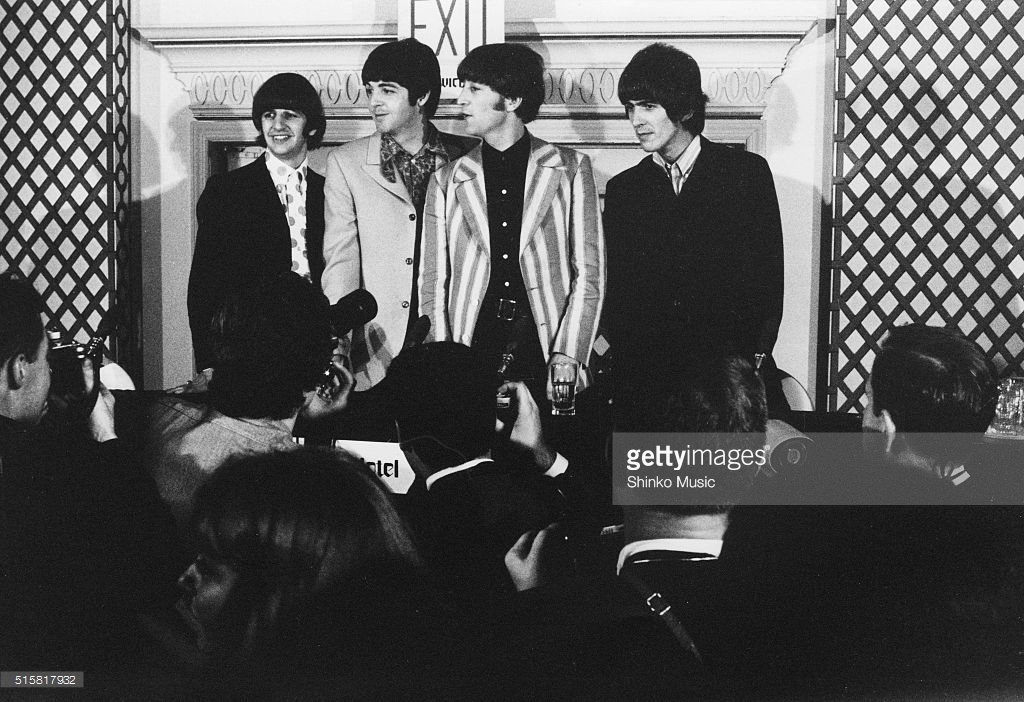
- 1962
- 1963
- 1964
- 1965
- 1966
- 1967
- 1968
- 1969
- 1970

